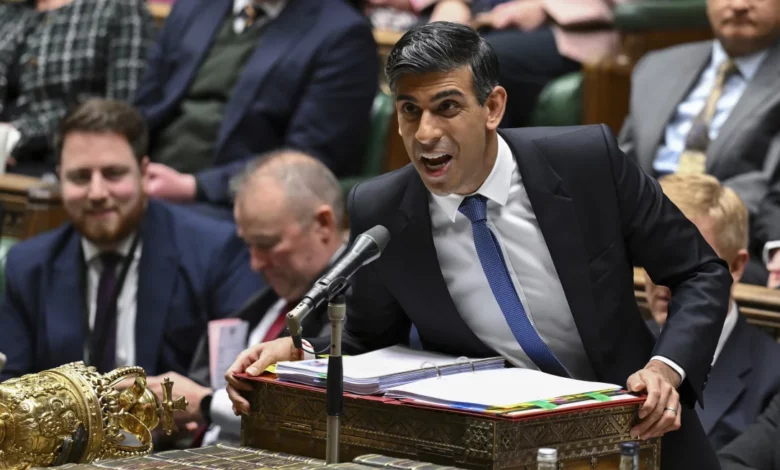
Prime Minister Rishi Sunak’s government won the vote in parliament by a majority of 320 to 276. The victory was a huge relief for Sunak: only 24 hours earlier 60 of his own Conservative MPs had rebelled by backing amendments to strengthen the bill. The amendments were defeated, causing concern that these MPs would also rebel on the main bill.
The Rwanda Safety Bill is supposed to end legal challenges that have thus far prevented Britain from sending refugees to Rwanda, after the two countries struck a deal back in 2022. The deal came after a dramatic increase in refugees arriving in Britain via small boats arranged by human trafficking gangs.
The UK wants to send people arriving illegally in Britain to Rwanda where they will remain while their asylum claims are processed. If they are successful, they will be able to return to the UK. If they are unsuccessful, they will be able to stay in Rwanda or seek asylum elsewhere.
Despite the deal being in place and Britain sending the Rwandan government hundreds of millions of dollars, no migrants have yet been sent to Rwanda. Judges and courts have argued that Rwanda is not a safe country to send refugees as they might face persecution in Rwanda or worse, be sent back to the place from which they have fled. That, critics say, is a clear violation of international human rights laws and refugee conventions that the UK is signed up to.
The Rwanda Safety Bill is designed to alleviate those concerns by providing assurances and oversight that the Rwandan government will comply with its human rights obligation. The United Nations High Commissioner for Refugees is not convinced and said on Tuesday that is still sees the Rwanda deal, even with the bill, as incompatible with international refugee law. This likely means that even if the bill becomes law, there will be legal challenges.
Indeed, page one of the bill carries the following statement from the Home Secretary, James Cleverly, under the heading “European Convention on Human Rights”:
“I am unable to make a statement that, in my view, the provisions of the Safety of Rwanda (Asylum and Immigration) Bill are compatible with the Convention rights, but the Government nevertheless wishes the House to proceed with the Bill.”
Even though the bill has passed the House of Commons, it must now jump through more legislative hoops that will slow down the passage of the bill into law and could possibly kill it – a bigger problem for Sunak who has promised to hold a general election at some point this year.
How did we get here?
Back in 2021, Nigel Farage – who more than anyone, put Brexit on the UK political agenda – started monitoring small boats crossing the channel from France and landing in England. These boats were filled predominantly with young men who were not white, Farage would claim.
The number of people crossing the channel in small boats leapt from 28,526 in 2021 to 45,755 in 2022, according to the Migration Observatory at Oxford University. Full figures for 2023 are not yet published, but it is expected to be high again.
Once again, Farage has forced the Conservatives into a corner and set them an impossibly high bar to clear.
To that end, stopping the small boats has become a key pledge of Sunak’s ever since he became PM back in late 2022. In some respects, it is natural ground for a Conservative PM who is languishing in the polls this close to an election. Migration is an issue that should appeal to his core voter and draw some attention from the bigger issues facing the country: the UK’s cost of living crisis and faltering public services.
Will it work?
If, and it’s a big if, Sunak does finally manage to get people on planes to Rwanda, it’s not certain to turn around his fortunes or put him in a better position to win the next election.
In a best-case scenario where all the boats stop and 40,000 or so people don’t come to the UK, it barely scratches the surface on net migration, which most recent estimates say was at 670,000 in 2023.
Small boats might be the face of migration right now, but the fact is they make up a fraction of total migration. It’s hard to imagine that people most motivated to vote because of migration will be happy with numbers still well over half a million, regardless of where those people come from.
It’s also not clear there’s a huge audience for hardline migration rhetoric in the UK. Polling on the Rwanda policy and migration more broadly is not hugely helpful because the answers people give are so motivated by the question asked.
“If you ask the public should people fleeing persecution be allowed in the UK, the answer is generally going to be yes. If you ask should illegal migration be reduced, they will generally say yes,” says Joe Twyman, director of the public opinion consultancy Deltapoll.
“The more you ask about it, the more complex that picture becomes. Different people have preferences for migration from different groups – be they from certain countries or able to perform certain jobs, like doctors or social workers,” Twyman adds. “There just isn’t one general view, which in turn means any politician can claim that their view on migration is what the public wants.”
Why does Sunak think this is a winner?
The truth is that Sunak might not even think this is a particularly big vote winner, rather a way of managing members of his own party who see Farage making a load of noise and think it’s going to cost the Conservatives votes if they ignore him.
Abandoning the policy would look like giving in and could be more dangerous for Sunak than fighting on, even if the policy ultimately fails, as it would give critics on the right ammunition to call him weak and failing Britain.
Farage and his allies are already doing this and it’s freaking out Conservative MPs who represent areas where migration is a big concern and could cost them seats.
This is the impossible position Sunak finds himself in, stuck between a policy that can be slowed down by people who think it breaks international law and people who don’t care about breaking international law. As he tries to navigate the narrow path between those two, the election looms closer and the Rwanda scheme looks increasingly like a waste of time and money. Which must leave Sunak wondering why he decided to make immigration, a fight he cannot win, a central plank of his platform in the first place.




